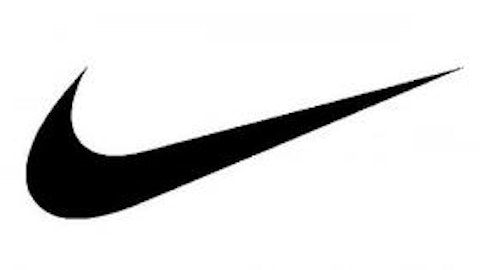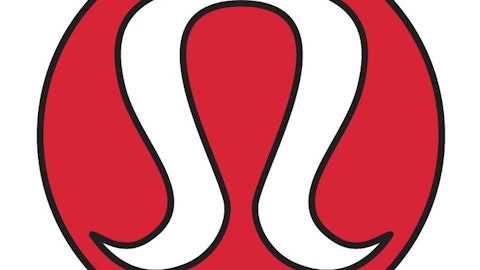Is yoga just a trend in North America, or does it have as much staying power as it has had in Eastern nations? That’s a question Lululemon Athletica inc. (NASDAQ:LULU) CEO Christine Day likely asked herself as she announced her resignation on June 10.
Maybe Christine senses that this yoga hype is about as long-lasting as Pilates or Tae Bo; remember those? She provided little explanation for her resignation, but it comes at a time when apparel companies need to be diversified to stay relevant. That’s something Lululemon Athletica inc. (NASDAQ:LULU) lacks.
On the record
Christine commented to Macleans magazine that, “The plans have been laid for the next five years and a vision for the next 10. I feel that the timing is now right to bring in the next CEO candidate who will drive that 10-year vision…” The statement is very vague and doesn’t give an indication of where Christine thinks the brand is going.
However, it doesn’t look like yoga is fading anytime fast. The company increased revenue by about 37% from fiscal 2012 to fiscal 2013. And the cost of selling all that yoga gear is relatively stable–the company reported last year a profit margin of nearly 20%. The company even announced on June 13 the planned addition of a men’s store by 2013. That sounds like a confident company that would be well-prepared for any trend change.
Yoga, fast fading fad?
Yoga looks most certainly like a fad, but the inevitable death of yoga doesn’t necessarily mean Lululemon Athletica inc. (NASDAQ:LULU) is tossed aside like dirty laundry. The company would surely introduce clothes for whatever other fad comes along, but it is the successful execution of such merchandise, coupled with diversification, that will make or break the apparel company. After all, Nordstrom, Inc. (NYSE:JWN) and Foot Locker, Inc. (NYSE:FL) have managed to keep their market performance alive despite changing trends.
The Nordstrom way: diversification
As one of the world’s most popular fashion retailers, Nordstrom has kept its brand current–but it has also diversified. The company owns a credit segment featuring a federal savings bank, a private label credit card, a Nordstrom, Inc. (NYSE:JWN) debit card and two VISA credit cards. However, the brand has mostly achieved its long-term success based on its ability to understand trends. This adds up to a company that has everything needed for long-term success. The management team consists of visionaries — a component Lululemon Athletica inc. (NASDAQ:LULU) will have to add soon — the business model is sound, and the work culture has been reported as positive.
The company is quickly expanding through Canada. It plans to add a fifth Canadian store in 2016–the store would open in the fashion destination Yorkdale. The first four Nordstrom stores open in Canada next year. Those openings could help the firm’s price to book ratio, which indicates the company is overvalued. It’s up about 8% from last year at 6.1. Like Lululemon Athletica inc. (NASDAQ:LULU), this company is perceived in a very good light, and its merchandise has continued to be fashionable throughout the years of various trends, which justifies its valuation.
The Foot Locker way: anticipate trends
Foot Locker, Inc. (NYSE:FL) also operates throughout the world, and rules an area in which Lululemon could strengthen its branding. Most people think of Foot Locker as only offering footwear, but Foot Locker also sells apparel. While the company isn’t as diversified as Nordstrom, it is in a position for growth. In fact, last month the company announced the acquisition of Runners Point Warenhandelsges, an online retailer and specialty athletic store. This shows the firm is following trends, and is adaptive enough to realize flexibility is best in this market. If Foot Locker continues to act on accurate visions of future trends, the company will be in for many years of success.
The acquisition of Runners Point improves the company’s prospects. While the price to book ratio indicates the company is undervalued, the steady expansion could further that undervaluation. The ratio is below the retail apparel sector’s average at 2.1. Sales have increased by 27% over the last four years. Foot Locker is also relatively recession-proof because it is one of the most popular stores for running shoes, and people need new shoes even during a recession.
Is Lululemon lululosing its niche?
The company is heavily weighted in the current appeal of yoga, but looks confident enough to adjust with new trends if yoga’s appeal wanes. Basically, it will take the ingenuity of company management to make the merchandise relevant for the consumers of the day. Whether or not the exiting Lululemon Athletica inc. (NASDAQ:LULU) CEO sees the company fading along with yoga in the years ahead is uncertain, but the incoming CEO will have to have a lock on trends of the day to make the company as long-lasting as Nordstrom and Foot Locker.
Phillip Woolgar has no position in any stocks mentioned. The Motley Fool recommends Lululemon Athletica. Phillip is a member of The Motley Fool Blog Network — entries represent the personal opinion of the blogger and are not formally edited.
The article Lululemon CEO Resignation Raises Questions originally appeared on Fool.com and is written by Phillip Woolgar.
Copyright © 1995 – 2013 The Motley Fool, LLC. All rights reserved. The Motley Fool has a disclosure policy.




